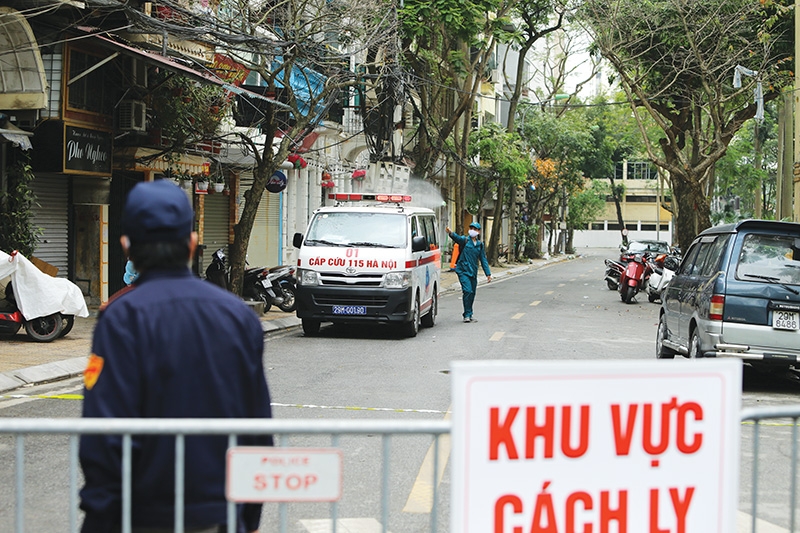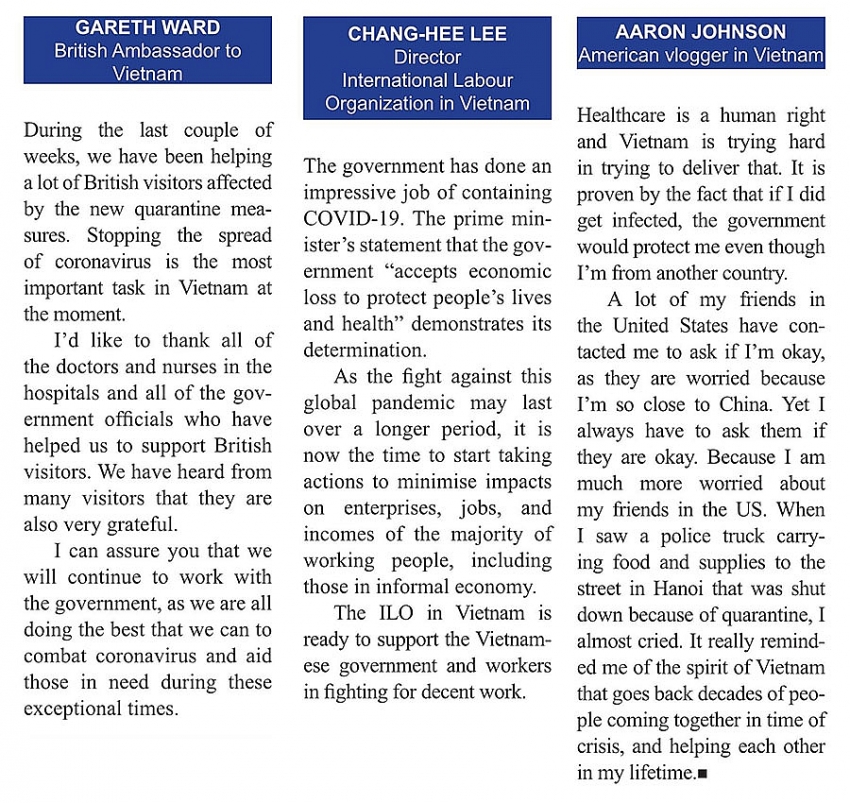Resiliency illustrated as Vietnam cares for others
 |
| The Vietnamese government has been applauded in quickly closing in on potentially infected people and areas, Photo: Duc Thanh |
 |
Thanks to Vietnam
In the battle against the novel coronavirus pandemic, while European countries are stricken with thousands of new infections and hundreds of deaths each day, some European citizens are seeing it from afar, having previously made plans to travel to Vietnam before the pandemic truly kicked in globally.
One US professor and company CEO who has been quarantined voluntarily in the National Hospital of Tropical Diseases in Hanoi’s Dong Anh district said, “The Vietnamese way of dealing with this has been so amazing and I simply cannot believe how powerful a country like Vietnam can be in a time of crisis. It is simply amazing.”
Arriving in Hanoi on March 2 in a plane that carried several positive cases, he and his adopted daughter immediately visited the hospital right after news broke of the 17th coronavirus patient from that same flight. “We thought that coming directly to the hospital was the best way to reduce risks and work for all,” he said.
When they arrived, it was clear that the hospital was taking the situation very seriously, with people wearing hazmat suits. Soon after arriving, they were given a room just for the two of them, and lunch soon came quickly.
They also quickly had blood, urine, saliva, and nasal samples taken, as well as x-rays taken of their lungs. One day later, they were moved to another room for two as a result of testing negative for COVID-19. This room became their home for five nights. Then they finally moved to the last room after twice testing negative, and were released after 11 days in quarantine.
“While we have been in the hospital, the party leader of Ngoc Ha ward has been messaging me to keep me up-to-date with the situation and making sure that we are ok. He has also supported our family at home with food parcels,” he said. The professor highly appreciated the way that Vietnamese people and government have responded so well to the pandemic since the holiday season. “I love Vietnam and its people, which is why I live here. I understand the Vietnamese way of dealing with this.”
While European countries are facing accusations of not doing enough to protect people, in Vietnam the government is getting a lot of support, not only from locals but also the expatriate community.
“I completely support what the government, the Centre for Disease Control, and the Ministry of Health have been doing,” cited a letter from the US professor praising health workers and the government. “I completely understand why it is the correct action that has been put in place. It is a very stressful time for all and the doctors and nurses in the hospitals are on the front line of this pandemic. I really appreciate and thank the doctors and nurses so much for their hard work at this time.”
Keeping people safe
Over the past week, Vietnam has been reporting around 10 new positive cases per day for the disease, most of them originating from European countries such as Italy, France, and the United Kingdom. Security and health declarations at the airports are being utilised to keep people in the country safe.
British citizen Gavin Wheeldon arrived at Hanoi International Airport just as his own country was beginning to suffer from the spreading pandemic.
At the airport, he was told about two choices – buying another flight out, or going into 14-day quarantine before entering Vietnam proper. Everything would be free unless his test was positive, he was told, at which point foreigners would need to pay hospital bills, while Vietnamese will be treated for free.
A translator did her utmost to help. “Suddenly it all becomes very human. We are guests in a country doing their best to protect themselves and are extending us that courtesy. Such is the good nature of Vietnam,” Gavin said.
The Vietnamese entered the quarantine zone as the foreigners made their choice. In the end, four Westerners were taken to the cargo entrance and boarded coaches. Their passports went into a bright yellow biohazard bag as a dangerous material.
The coach was sprayed with disinfectant and passengers were taken to a huge courtyard where their luggage was also sprayed. There are two huge dormitories with fencing, and everyone wore protective clothing. After registration, they were instructed to the rooms. It became apparent to Gavin that Europeans were kept away from the others. and men and women were also separated. Anyone vulnerable or with children went into separate rooms.
“The airport was chaotic, but quarantine is highly organised,” Gavin noted, admiring the way that Vietnam is dealing with the pandemic.
Efficient quarantine
Booking a tour long before the global health crisis occurred, 18 French and Belgian tourists did not know that their resort next to Cua Dai Beach in Hoi An ancient town would end up becoming a quarantine zone.
“We went through very different moments. From the excitement of coming to Vietnam to the anxiety of knowing we were on the flight carrying people infected by COVID-19. But we are lucky because at least we are still staying in a luxurious place,” said Jan Bleyenberg.
Bleyenberg had just retired, and is now a consultant of the Association of Belgian Journalists. Witnessing what he and his friends were going through and the safety that Vietnam government is doing utmost to ensure, as well as the hospitality of local people, he exclaimed, “Everything here is even better than in Europe. The weather is good, the food is delicious, the quarantine zone is luxurious, and there are comfortable rooms, along with a swimming pool. We did not get any trouble other than it is a bit inconvenient we cannot go out for a walk.”
He promised to write an article about the experience for a newspaper in his homeland. “The travel is too impressive for us to forget,” he added.
Vietnam, which has just recently escaped the status of a low-income country, would have never anticipated that one day its calm and resilient efforts would put it at the forefront of dealing with a crisis on this scale.
But as a result, the country is growing into a warmer place by the day, not only through state actions, but by citizens opening up their hearts and extending a hand to those in need. Just last year, Vietnam made it on HSBC’s list of the best places in the world to live and work for expats – and there is no way to say how far it will rise through the humanity the locals show to visitors.
“I believe that Vietnam’s position and image in the eyes of the international community have improved a lot. In the next list after the pandemic, I am sure that Vietnam will be one of the leading countries both in humanity and hospitality, after all it showed in these most trying circumstances,” a visitor told VIR.
 |
What the stars mean:
★ Poor ★ ★ Promising ★★★ Good ★★★★ Very good ★★★★★ Exceptional
Themes: COVID-19
- 67 million children missed out on vaccines because of Covid: UNICEF
- Vietnam records 305 COVID-19 cases on October 30
- 671 new COVID-19 cases recorded on October 1
- Vietnam logs additional 2,287 COVID-19 cases on Sept. 21
- People’s support decisive to vaccination coverage expansion: official
Related Contents
Latest News
More News
- Foreign leaders extend congratulations to Party General Secretary To Lam (January 25, 2026 | 10:01)
- 14th National Party Congress wraps up with success (January 25, 2026 | 09:49)
- Congratulations from VFF Central Committee's int’l partners to 14th National Party Congress (January 25, 2026 | 09:46)
- 14th Party Central Committee unanimously elects To Lam as General Secretary (January 23, 2026 | 16:22)
- Worldwide congratulations underscore confidence in Vietnam’s 14th Party Congress (January 23, 2026 | 09:02)
- Political parties, organisations, int’l friends send congratulations to 14th National Party Congress (January 22, 2026 | 09:33)
- Press release on second working day of 14th National Party Congress (January 22, 2026 | 09:19)
- 14th National Party Congress: Japanese media highlight Vietnam’s growth targets (January 21, 2026 | 09:46)
- 14th National Party Congress: Driving force for Vietnam to continue renewal, innovation, breakthroughs (January 21, 2026 | 09:42)
- Vietnam remains spiritual support for progressive forces: Colombian party leader (January 21, 2026 | 08:00)

 Tag:
Tag:


















 Mobile Version
Mobile Version